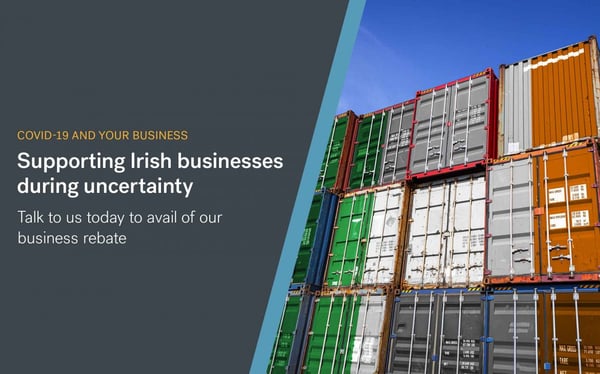One of the big reasons international businesses choose to incorporate in the Republic of Ireland is that the tax burden is among the lowest in Europe. So what taxes do businesses pay in Ireland? Businesses pay just 12.5% corporate tax in Ireland, with the possibility of even lower rates in certain circumstances.
Low corporate tax rates are a big draw for the multinationals who occupy Dublin’s Silicon Docks area, and the reason big tech firms in particular often choose to base their European headquarters in Ireland. Over half of Ireland’s €15bn corporate tax revenue in 2021 comes from the 10 largest multinationals and 80% of net receipts are from foreign-owned multinationals. If you’re planning to conduct business in Ireland, we cover the basics of Irish tax below.
How much tax does a sole trader pay in Ireland?
Sole traders aren't liable for corporate tax, since their business earnings are declared through personal self-assessment. Instead, sole traders have to register as self-employed if their revenue is above €5,000 and are liable for income tax, Pay Related Social Insurance (PRSI) and Universal Social Charge (USC) on net profits.
These are declared using the Personal Public Service Number (PPSN). As of 2022, the Irish Revenue Commissioners tax the first €36,800 of a sole trader’s revenue (for a single person) at 20%, with a flat 40% tax rate above this threshold.
Additionally, any business with a turnover above €75,000 (for goods) or €37,500 (for services) must pay value added tax (VAT), although rates vary from as low as 4.8% (on livestock) up to 23%.
Which businesses pay corporate tax in Ireland?
Limited liability companies (where there's a separation between business and personal earnings) are subject to a 12.5% corporate tax on their worldwide net profits. Note that taxable profits don't necessarily equal accounting profits.
Corporate taxes are paid via the Revenue Online Service (ROS) using form CT1, with some stringent penalties in place for under-declaring.
To qualify for the 12.5% tax rate, a company must be incorporated and tax resident in Ireland. That means that it must be centrally managed and controlled in the Republic:
-
The majority of directors should be residents in Ireland.
-
The business needs to be actively trading in Ireland, not just using a mailbox or local bank account.
-
Records must be kept for six years.
These requirements ensure that a European Union or multinational company cannot simply register a company on paper in Ireland and carry on business activity elsewhere but still benefit from the 12.5% corporate tax rate.
The directors, employees, and products or services need to be present in Ireland to qualify. Although the low corporate tax rate has often led to Ireland being labelled as a tax haven, there's no mechanism for a “brass plate company” to offshore its business headquarters in Ireland without any meaningful local connection.
Irish corporate tax in context
The 12.5% corporate tax on trading income is lower than the Organisation for Economic Co-operation and Development (OECD) average for the European Union (21.7%) and worldwide average (23.5%).
By contrast, the corporation tax rate is 19% in the United Kingdom; 27% in the United States, and 30% in Germany. Not surprisingly, multinationals typically opt to headquarter their European operations in Ireland, which in turn has helped Ireland to build the 12th most competitive economy in the world pre-Covid, with a GDP growth of 5.6%.
How businesses can pay less (or more)
The 12.5% corporate tax rate doesn't apply to non-trading income from interest, royalties, or rental income from land, for example. These attract a higher rate of 25%. Similarly, certain business sectors such as petroleum, land dealing and mining are excluded from the lower rate and must also pay 25% corporate tax.
Multinational corporations can also take advantage of bilateral tax treaties and complex accounting flows to shift their global profits to Ireland and pay even lower corporate tax. This transfer pricing strategy allowed Apple to pay just 2% corporation tax in Ireland between 2009 and 2012, although the EU subsequently ordered Ireland to recover €13 billion in unpaid taxes.
For businesses that baulk at a 2% corporate tax rate, it's technically possible to go even lower. If you register a new company in Ireland in a trade that wasn't previously carried out in the Republic, and your tax liability for the accounting period is €40,000 or less, there’s a special provision to enjoy zero corporation tax for three years. Again, this relates to the research and development tax credit scheme introduced in 2004.
The future of business tax in Ireland
How long will businesses enjoy Ireland’s low corporate tax rate? Changes are afoot and the OECD is determined to establish a minimum 15% global corporation tax rate. Although Ireland is one of only a handful of countries not to sign up to the agreement, it has agreed to a 15% corporate tax rate for companies generating consolidated revenues over €750 million from 2023 onwards.
Businesses with revenues under that threshold will still enjoy the 12.5% rate. Given that just 100 companies account for 80% of Ireland’s tax revenue, however, the implication is that most companies will see an increase in their corporate tax burden.
This information is correct as of July 2022. This information is not to be relied on in making a decision with regard to an investment. We strongly recommend that you obtain independent financial advice before making any form of investment or significant financial transaction. This article is purely for general information purposes. Photo by Damiano Baschiera on Unsplash.













